Dachshund Health Issues: 5 Neurological Problems
Introducing the tiny, yet mighty dachshund… a big dog trapped in a small dog body, as we like to say at Southeast Veterinary Neurology. Originally bred to hunt badgers in their burrows, the little dog’s temperament is generally described as courageous, tenacious, lively, intelligent, and loyal. Today, they make loveable family companions and are affectionately referred to as sausage dogs, wiener dogs, and doxies. But what about dachshund health issues?
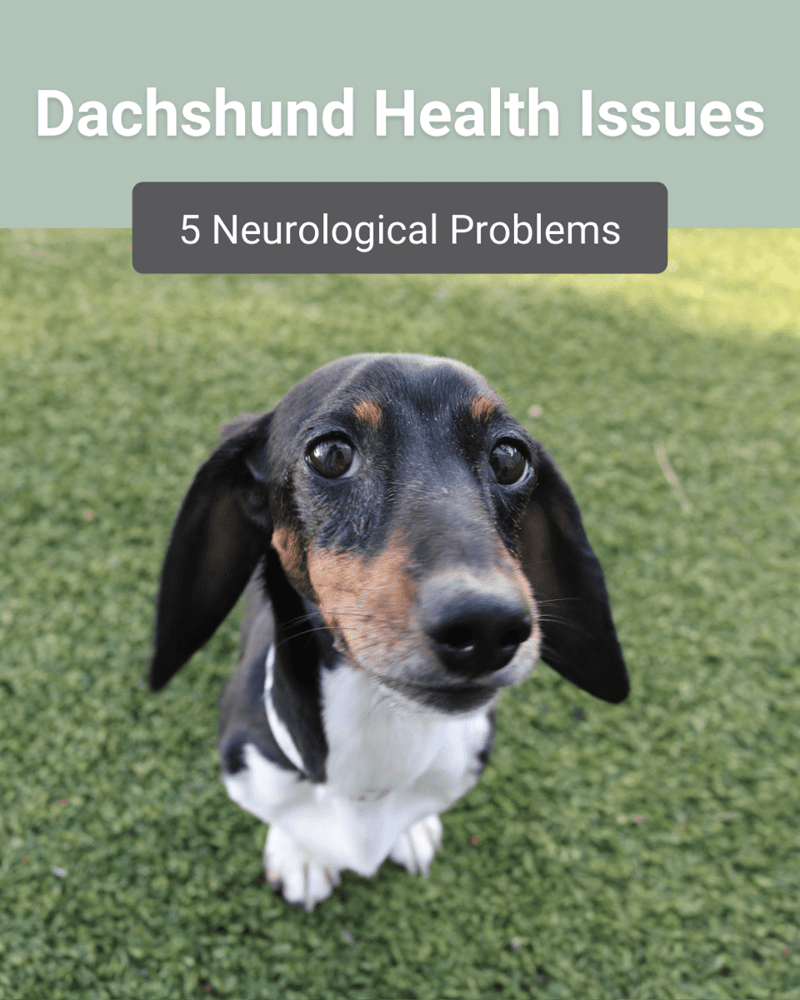
Are There Any Serious Dachshund Health Issues?
There’s something you should know. We see a lot of doxies at Southeast Veterinary Neurology. Like many breeds, dachshunds are prone to certain health issues, including several neurological problems.
5 DACHSHUND NEUROLOGICAL PROBLEMS
Neurological problems are problems with the nervous system. The nervous system is made up of the brain, spinal cord, nerves, and muscles, and it helps the body interact with its surroundings through vision, touch, smell, hearing, and balance. Unfortunately, dachshund health issues include several neurological problems due to their unique skeletal structure and selective breeding.
These are five neurological problems we see in dachshunds specifically:
Intervertebral Disc Disease (IVDD) in Dachshunds
An extremely common dachshund health issue affecting up to 25% of the breed, IVDD occurs when the shock-absorbing discs between the bones of the spine degenerate early on in life. The once fluid-filled discs become calcified, eventually herniating and rupturing.
The resulting bulge pinches the spinal cord, causing significant neurological problems in dachshunds, depending on where the affected disc is located. For example, a herniated disc in the neck will cause weakness in all four limbs, but if the disc is located further down the back, only the rear limbs will be affected.
Depending on the severity, your veterinary neurologist will recommend either medical management or surgery. When diagnosed and treated early, the prognosis is generally excellent, although relapses are possible.

Lafora Disease in Dachshunds
Lafora disease is a rare lysosomal storage disorder in which brain cells are unable to rid themselves of waste products. The waste continues to build up until the cells become so overwhelmed with waste material that they die off.
Lafora is a genetic dachshund health issue of the miniature wire-haired variety, but generally occurs later in life. The hallmark of this disease is myoclonic epilepsy, which consists of seizures that are characterized by brief, shock-like jerking spasms of a muscle or muscle group.
Unfortunately at this time, like other lysosomal storage diseases, diagnosis is difficult, there is no definitive cure, and prognosis is poor.
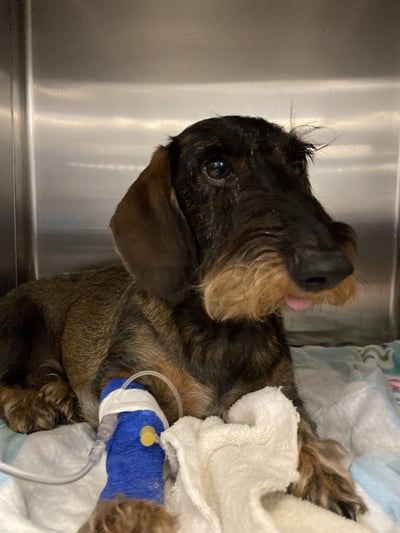
Myasthenia Gravis in Dachshunds
Myasthenia gravis is a potential dachshund health issue, characterized by a generalized weakness in patients that is made worse with exercise.
There are two forms: genetic and acquired. In the genetic form, dogs are born without a receptor on the muscle so that nerves cannot communicate with muscle. Dachshunds tend to have the genetic form, and therefore, the disease usually makes its appearance early on in doxies, around eight weeks.
Myasthenia gravis patients are monitored closely for esophageal function and treated with medication that works to assist in signaling from nerves to muscle. With the genetic form, your doxie will most likely be on this medication for life.
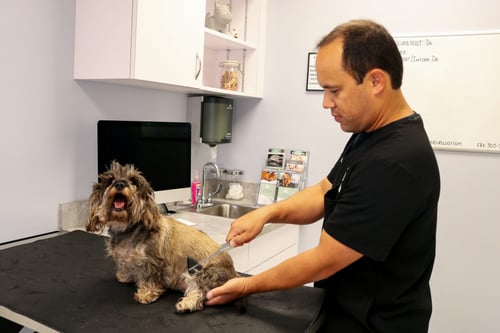
Narcolepsy in Dachshunds
Another rare, but interesting disease that can affect dachshunds is narcolepsy. Dachshunds with this neurological problem either aren’t producing hypocretin or are missing the receptor that responds to hypocretin. Hypocretin is a hormone in the brain that helps with sleep/wake cycles and stimulus.
Often, sudden catatonic-like states are induced by excitement in these patients, which are known as cataplexy. Narcolepsy is not a dangerous dachshund health issue per say, but the sudden attacks of sleepiness can have a major impact on quality of life, so treatment is ideal.
Rarely, narcolepsy can be due to a mass in the brain, but usually, it is a genetic disease in dachshunds. After ruling out an underlying cause, treatment involves finding the best combination of antidepressant and stimulant medications for your individual doxie.
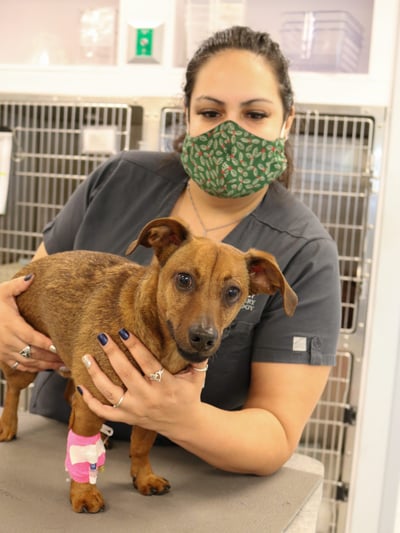
Cerebellar Abiotrophy in Dachshunds
Cerebellar abiotrophy, or degeneration, is a possible dachshund health issue that occurs when the cells that help with the body’s balance system die off earlier than they should in life.
Without these cells, the brain is unable to receive input from nerves, and therefore, unable to send out appropriate signals to the body in order to maintain balance. Dachshunds that suffer from this neurological problem will be overall uncoordinated and seemingly unable to keep still. They may fall to one side, circle, and experience fine head tremors.
Unfortunately, this is another disease in dachshunds that has no definitive treatment and will progressively worsen. Physical therapy can provide some relief, but generally speaking, once a veterinary neurologist diagnoses your dog with cerebellar abiotrophy, it’s really just a matter of monitoring your doxie’s quality of life.
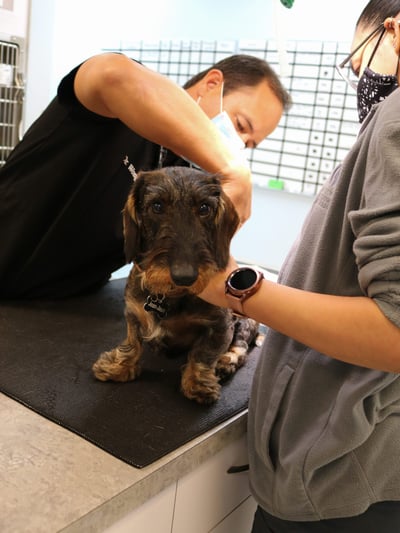
What to Do if You Suspect Neurological Dachshund Health Issues
Because so many neurological problems share common symptoms, it is critical that a veterinary neurologist evaluate your dachshund’s health issues. This will not only rule out other possibilities, but it will also help identify the best treatment option for your doxie, which can vary greatly from case to case.
In most instances, the earlier a health problem is identified, the better the outcome for the patient. So, if your dearest doxie is experiencing any symptoms of neurological problems at all, please don’t wait to seek expert medical advice.
Southeast Veterinary Neurology has teams of compassionate professionals across South Florida in Miami, Boynton Beach and Jupiter, as well as Virginia Beach, standing by 24 hours a day to get to the bottom of dachshund health issues! Call any of our locations today.